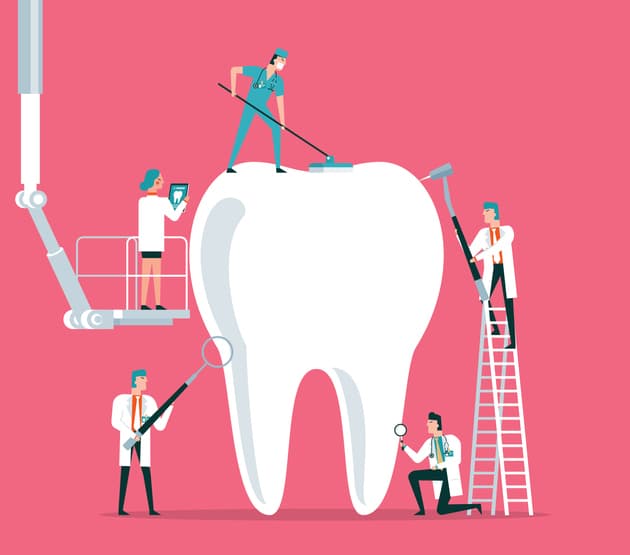 Many different types of oral health care providers could become involved in the care of your teeth, gums, and mouth. A brief description of these various health care providers is as follows:
Many different types of oral health care providers could become involved in the care of your teeth, gums, and mouth. A brief description of these various health care providers is as follows:General Dentist
A general dentist is your primary care dental provider. This dentist diagnosis, treats and manages your overall oral health care needs, including gum care, root canals, fillings, crowns, veneers, bridges, and preventive education.
All practising general dentists have earned either a DDS or DMD degree (doctor of dental surgery or doctor of dental medicine, respectively). There is no difference between the two degrees or the curriculum requirements that dentists must meet. Some schools simply award the one degree, while others award the other.
Generally, three or more years of undergraduate education plus four years of dental school is required to become a general dentist. Additional post-graduate training is required to become a dental specialist.
Endodontist
An endodontist is a dental specialist concerned with the causes, diagnosis, prevention, and treatment of diseases and injuries of the human dental pulp or the nerve of the tooth. This specialist may perform simple to difficult root canal treatments or other types of surgical root procedures.
Oral Medicine & Pathology
Oral medicine is the speciality of dentistry that provides for the care of the medically complex patient through the integration of medicine and oral health care. This includes the diagnosis and management of oral diseases including oral cancer, lichen planus, candidiasis, and aphthous stomatitis.
Oral and Maxillofacial Surgeon
An oral and maxillofacial surgeon is the oral health care provider who performs many types of surgical procedures in and about the entire face, mouth, and jaw area. Oral and maxillofacial surgeons treat accident victims who suffer facial injuries and offer reconstructive and dental implant surgery.
They treat patients with tumours and cysts of the jaws. The types of surgeries an oral surgeon may perform include: simple tooth extractions, complex extractions involving removal of soft tissue or overlying bone or remaining roots, impacted teeth (especially wisdom teeth) removal, soft tissue biopsies, removal of tumours in the oral cavity, implant positioning, complex jaw realignment surgeries involving facial or bite discrepancies, fractured cheek or jaw bone repair and soft tissue (cleft palate or lip) repair. Oral and maxillofacial surgeons receive anywhere from 4 to 8 years of additional training after dental school.
Orthodontist
An orthodontist is the oral health care provider who specializes in the diagnosis, prevention, interception, and treatment of malocclusions, or “bad bites,” of the teeth and surrounding structures. Malocclusions can result from crowded, missing, or extra teeth or jaws that are out of alignment. This specialist is responsible for straightening teeth by moving them through bone by the use of bands, wires, braces, and other fixed or removable corrective appliances or retainers. This specialist treats children as well as adults who may wish to improve their appearance and bite.
Pediatric Dentist/Pedodontists
A pediatric dentist is the oral health care provider who specializes in the diagnosis and treatment of the dental problems of children from the age of one or two to early adulthood. This dentist can detect, treat, or refer (as needed) problems with decayed, missing, crowded, or crooked teeth. A pediatric dentist has at least two additional years of training beyond dental school. The additional training focuses on the management and treatment of a child’s developing teeth, child behaviour, physical growth and development, and the special needs of children’s dentistry.
Periodontist
A periodontist is the oral health care provider who specializes in diagnosing, treating, and preventing diseases of the soft tissues of the mouth (the gums) and the supporting structures (bones) of the teeth (both natural and man-made teeth). This dentist diagnoses and treats gingivitis (inflammation of the gums) as well as periodontitis (gum and bone disease). A periodontist may perform the following procedures: simple and deep pocket cleanings, root planing, crown lengthening procedures, soft tissue and/or bone grafting, gingival or flap procedures, soft tissue recontouring or removal (gingivoplasty or gingivectomy), hard tissue recontouring (osteoplasty), and implant placement.
Prosthodontist
A prosthodontist is the oral health care provider who specializes in the repair of natural teeth and/or the replacement of missing teeth on a much larger scale than the general dentist. The prosthodontist uses artificial teeth (dentures) or crowns (caps) to replace the missing or extracted teeth. The prosthodontist is also very involved in the replacement of teeth using dental implants. In addition, specially trained prosthodontists work with patients with head and neck deformities, replacing missing parts of the face and jaws with artificial substitutes.
